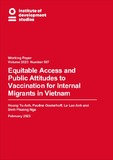| dc.contributor.author | Hoang, Tu-Anh | |
| dc.contributor.author | Oosterhoff, Pauline | |
| dc.contributor.author | Le, Lan Anh | |
| dc.contributor.author | Dinh, Phuong Nga | |
| dc.coverage.spatial | Vietnam | en |
| dc.date.accessioned | 2023-02-16T12:09:46Z | |
| dc.date.available | 2023-02-16T12:09:46Z | |
| dc.date.issued | 2023-02-16 | |
| dc.identifier.citation | Hoang, T.A.; Oosterhoff, P.; Le, L.A. and Dinh, P.N. (2023) Equitable Access and Public Attitudes to Vaccination for Internal Migrants in Vietnam, IDS Working Paper 587, Brighton: Institute of Development Studies, DOI: 10.19088/IDS.2023.011 | en |
| dc.identifier.isbn | 978-1-80470-092-1 | |
| dc.identifier.issn | 2040-0209 | |
| dc.identifier.uri | https://opendocs.ids.ac.uk/opendocs/handle/20.500.12413/17872 | |
| dc.description.abstract | This mixed methods participatory study explores equity and fairness in access to Vietnam’s Covid-19 vaccination programme, when the Covid-19 vaccine was scarce, with a focus on internal migrant workers. At the beginning of the pandemic large numbers of Vietnamese migrants from rural areas lost their jobs. Migrants are vital to the Vietnamese economy. Many factories that produce goods for export employ internal migrants. Before the pandemic, these workers faced inequalities of access to available health services and nutritious food. Although the Vietnamese state aspires to universal access to health, internal migrant workers living outside their village do not have long-term household book registration, which is the key to access many public services including health care and prevention. We found that migrant workers, especially those working in the export zones where factories produce for export, did have access to vaccination. However, there are intersectional inequalities between internal migrants based on other characteristics such as (dis)ability. Policies that give priority to economic productivity disadvantage those who are not considered vital or essential from that perspective. The delegation of some of the vaccination access decisions to local authorities, for example village headmen, allowed for flexibility based on local contexts and needs. However, the capacity of implementers at grass-root level to respond to emerging situations was not identified clearly in implementing guidelines. This resulted in a lack of transparency in local decision-making. We recommend establishing an independent body with representatives from various groups to monitor policy implementation and decision-making for vaccination and emergency preparedness for future outbreaks. More research is needed to explore the social acceptability of medical technologies and medical interventions, especially in prolonged epidemics such as the Covid-19 pandemic. | en |
| dc.description.sponsorship | Foreign, Commonwealth & Development Office | en |
| dc.language.iso | en | en |
| dc.publisher | Institute of Development Studies | en |
| dc.relation.ispartofseries | IDS Working Paper;587 | |
| dc.rights | This paper was funded by the UK Government’s Foreign, Commonwealth & Development Office (FCDO) through the Covid Collective. It is licensed for non-commercial purposes only. Except where otherwise stated, it is licensed for non-commercial purposes under the terms of the Open Government Licence v3.0. | en |
| dc.rights.uri | https://www.nationalarchives.gov.uk/doc/open-government-licence/version/3/ | en |
| dc.subject | Governance | en |
| dc.subject | Health | en |
| dc.subject | Migration | en |
| dc.subject | Work and Labour | en |
| dc.title | Equitable Access and Public Attitudes to Vaccination for Internal Migrants in Vietnam | en |
| dc.type | IDS Working Paper | en |
| dc.rights.holder | © Institute of Development Studies 2023. © Crown Copyright 2023. | en |
| dc.identifier.team | Knowledge Technology and Society | en |
| dc.identifier.doi | 10.19088/IDS.2023.011 | |
| dcterms.dateAccepted | 2023-02-16 | |
| rioxxterms.funder | Default funder | en |
| rioxxterms.version | VoR | en |
| rioxxterms.versionofrecord | 10.19088/IDS.2023.011 | en |

